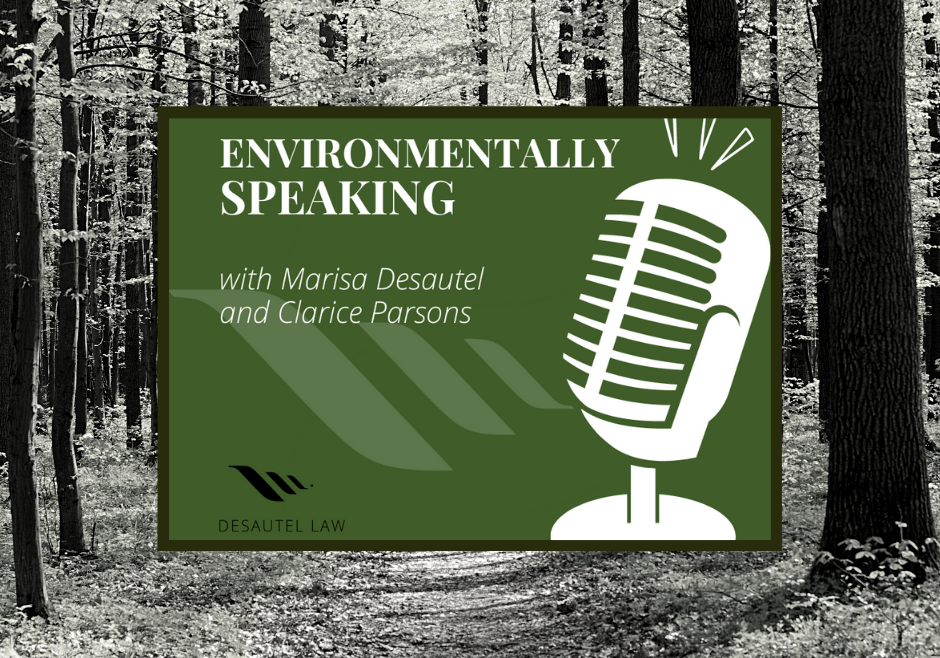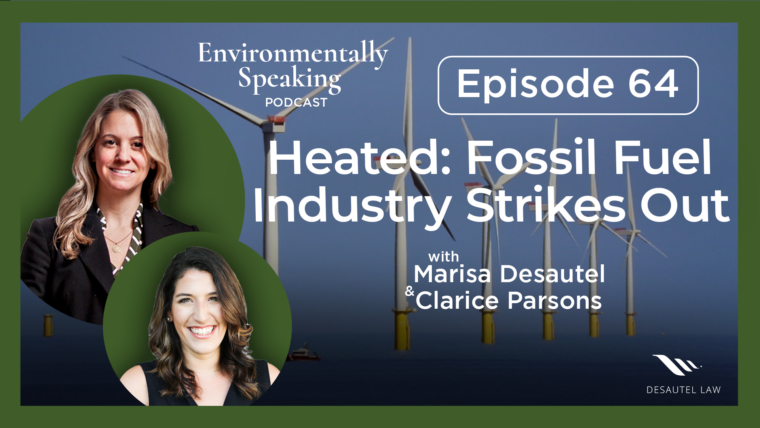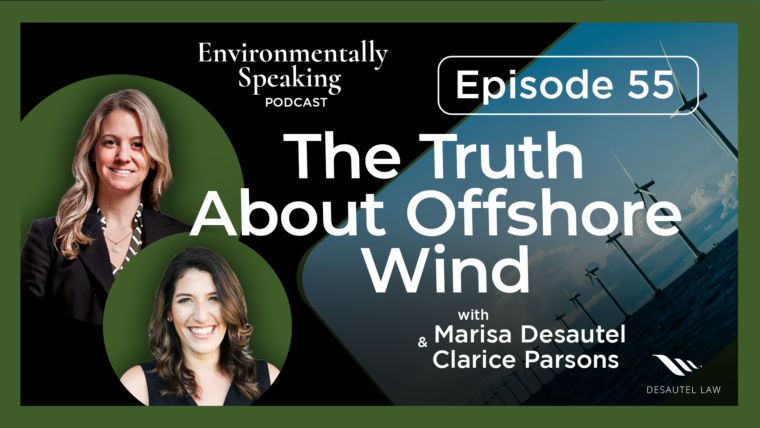Pushing Renewable Energy
This week we bring up an article that was recently published (https://www.gloucestertimes.com/opinion/letter-biden-climate-change-plan-forgets-fishing-industry-communities/article_609745be-09f7-11ed-8d11-8f912596b992.html) and the current administration visiting the Brayton Point Power plant. The President has earmarked that facility as the new hub, and infrastructure to transform offshore wind power into electricity, land side. We go into detail and share what this means for the National Environmental Protection Act, or NEPA moving forward. Is it the right thing to do?
Episode 46 -Transcript
CLARICE: Good morning, everybody and welcome to today’s episode of Environmentally Speaking.
MARISA: Hi, everybody. I’m Marisa Desautel having some functional issues with the headphone set that I’m working with. I’m also an environmental attorney here in Rhode Island, but more importantly this headset is getting the best of me. I started out with hair from Stranger Things and then Clarice being the younger, hipper, smarter individual told me to put it over my hair, but now it’s just sliding around my head, so.
CLARICE: It’s a look.
MARISA: Those of you watching the podcast, hopefully there’s entertainment value here on top of the thrilling narrative that we provide for you to listen to. Dear God.
CLARICE: And for those of you who are listening, just envision early Brittany Spears headsets.
MARISA: Oh, my God.
CLARICE: Think pop star, but in this case pop star in a wind tunnel. We’re doing great.
MARISA: It’s like you know the MTV VJs from the – you know what, never mind. I’m dating myself. All right. What are we talking about today, Clarice?
CLARICE: So we are talking about something very relevant, something very recent. Our president President Biden came to Somerset, Mass.
MARISA: He did.
CLARICE: Yeah. That’s pretty local. I mean, it’s not Rhode Island, but for me it is a ten-minute drive to the site that he was at, so that was exciting.
MARISA: Where was he?
CLARICE: He was at the Brayton Point power plant.
MARISA: In Somerset, Massachusetts, right?
CLARICE: In Somerset, yes. So for a little bit of background, the Brayton Point power plant used to be a nuclear facility and has since been decommissioned and they’re looking to find a new way to use that site and renovate it and change it into something else energy related which was great because Biden was one town over and talking about the climate. How could we not talk about this today.
MARISA: Agree. Were you a witness to the decommissioning of the power plant at Brayton Point a few years ago?
CLARICE: I was not able to witness it because they had – so [inaudible] people had put out their lawn chairs at viewing points really, really early in the morning. Think like people setting up for a parade. They were camped out and ready to watch and I just did not have that energy in me, but I felt it all the way at my house.
MARISA: No kidding.
CLARICE: Yeah. Yeah. It was amazing. I was making coffee and then all of a sudden everything shook for a little bit.
[0:02:56] MARISA: Wow. I actually went a few years ago. I did not set out a lawn chair, but I did find a decent vantage point and was able to watch the detonation. I was excited because I thought that was signaling a shift to more renewable smartly sited renewable energy projects. And hearing what President Biden had to say at that same site years later, I’m more than a little dismayed. And we can get into that, but it’s interesting. Life goes on. You’re in a moment in your life and you’re witnessing something that you’re excited about. You think there’s potential and then years later you’re disappointed. You just never know what’s going to happen in life.
CLARICE: I feel like that was everybody December 31st, 2019, into January 1st, 2020.
MARISA: Gee, what happened then?
CLARICE: It’s that same kind of vibe where everybody’s excited and they’re like, this is my year. And it wasn’t. And the detonation of this was like, yes, we’re making positive change. Oh, okay. So, all right. We’re kind of beating around the bush. So why are we so dismayed? What’s going on?
MARISA: There has been a very recent and drastic aggressive shift by the current administration to start pushing renewable energy projects forward by categorizing climate change as a clear and present danger. For those of us that like to read John Grisham novels, we know that that phrase is a trigger for the White House to start moving forward in an emergency capacity which opens up the executive branch to issue emergency orders and move forward with way more discretion than you would under normal or non-emergency times.
The particular example that Clarice and I are talking about has to do with the Brayton power plant – Brayton Point power plant. Excuse me. The president has earmarked that facility as the new hub and infrastructure to transform offshore wind power into electricity landside. I’m hoping that in the show notes you can work your magic, Clarice, and include a link to an article that was the impetus for me wanting to talk about this issue this morning. So you’re shaking your head. I’m assuming that means, yes, you will link that article in the show notes?
[0:06:01] CLARICE: Yes. I will link that for everybody. It is in the Gloucester Daily Times and I’ll make sure to include it for everybody to read. It’s a very interesting perspective. It’s by the Massachusetts Fishermen Partnership and it’s a completely different viewpoint on this issue that’s just not being heard and, frankly, I don’t think being fully considered.
MARISA: Agreed, yeah. And as you know in Desautel Law’s experience there’s a – we seem to be the only group of attorneys that’s really concerned with the environmental impacts associated with these offshore wind projects. Where’s the money? The money’s with the developer. The money is with the federal government. The money is with these projects moving forward quickly because climate change has been earmarked as a clear and present danger. Why does this upset me so, Clarice? You’ve known me for a few years now. Why do I get so upset about this kind of thing?
CLARICE: Lord, let me count the ways. For a start, it feels a little too late.
MARISA: Yeah.
CLARICE: That’s a huge issue. It’s now this big push to make a massive change when we could have been making smaller sustainable changes this whole time and not needed it.
MARISA: That’s exactly right.
CLARICE: Yeah. That’s the start of it.
MARISA: So we’ve known about climate change and misreliance on fossil fuels since I was born in 1977. There was a study that came out called Pikes Peak and it was written by a scientist whose last name was Pike and he said that we would hit our peak usage of fossil fuels in 1977 and following that peak it would be a rapid and exponential decline. So what did government and policy leaders do with that information? Nothing, because the money was with the fossil fuel industry, your oil, your gas, your coal.
Now the money is with these offshore wind projects who are all non-American companies, I’ll point out, and the federal government is backing these companies, pushing offshore wind projects forward very, very quickly and ignoring the fact that these projects are going to have a very detrimental impact on our environment, the seafloor bottom, habitat that exists there. We are industrializing our oceans and we’re doing it in monthly time frames, not decades like we should have been doing but monthly.
[0:09:02] CLARICE: And to pause right there, when you’re saying detrimental to our ocean environment I know that for a lot of people they don’t always think about this part, but I recently saw somebody describe these pipelines that have to go in to connect these wind turbines back to something on shore. Think of it like a highway going through your neighborhood. I mean, there’s places where fishes meat and lay eggs and migrate –
MARISA: And live.
CLARICE: Exactly. Exist in those spaces, and that’s not even counting the vegetation, any sort of crustaceans that are over there. Sure, environmentally we would love to protect the lobsters and crabs, but also what else is New England known for? It’s a huge part of our tourism, our economy, our identity and now just take a highway and go through it just for a little bit of framework for folks on why that’s such a big deal and why doing that in a month span or in months can be so shocking versus taking longer time to kind of prepare the area.
MARISA: I’m an environmentalist, so for me my main focus and main concern is the impact to the habitat, the seafloor bottom, the destruction of really unique undersea landscape that we’ve not studied sufficiently and we’re just going to go in there and drop concrete and infrastructure that will remain there without knowing what we’re disturbing. And there’s a lot of misinformation out there about these offshore wind projects being green and environmentally friendly. Renewable energy is necessary, absolutely. It was necessary in 1977.
Renewable energy is not necessary where it’s being sited at the pace that it’s being moved forward. That’s my concern. I’ve got no problem with renewable energy if you do it the right way. So there’s a federal statute called the National Environmental Protection Act or NEPA for short. We’ve talked about it, I think, in other podcasts. As part of President Biden’s speech in Somerset, he indicated that he was going to remove regulatory barriers and regulatory hurdles so that these projects could go forward quickly because they’re green. What does he mean by that.
CLARICE: I’m so happy you’re talking about this. I flagged this as a question.
MARISA: What does he mean by that. He means he’s going to, through this clear and presents danger characterization, bypass NEPA. NEPA is the federal statute that requires environmental impact assessments, environmental analysis, environmental reviews and forces everyone involved pretty much to consider what the actual deleterious impacts from these projects are going to be. And make no mistake about it, these projects will be devastating to our oceans and the president is saying, we’re going to get rid of the federal statute that requires us to slow down and really study what’s out there and figure out alternatives, figure out how to mitigate these impacts, figure out how to make arrangements for the impacts that we cannot avoid and they’re just not going to do that.
They’re just going to go forward and say, to hell with NEPA, to hell with the impacts, we need these offshore wind projects to go online right now. So that’s really upsetting to me as an environmental attorney because NEPA is a framework for environmental protection that was created through case law, through environmental groups coming forward and saying, hey, this isn’t right, the federal government needs to study the existing natural resource before it can move forward with these projects.
You know, that’s years and years and years of environmental advocacy through litigation, through case law, through political change and the federal law being changed over time to be more protective of the environment. Now is not the time to get rid of those protections. Now is the time to make sure that those protections are being enforced. So my heart breaks for anyone that cares about the environment. It’s like the U.S. Supreme Court taking away abortion rights for women. We are going back to the 1950s right now with environmental protection and it’s heartbreaking for me.
[0:14:10] CLARICE: Yeah. It’s devastating. And to focus in on – in this article it quotes Biden saying, the ocean is open for clean energy of our future and the president vows to clear every federal hurdle and streamline federal permitting that brings these clean energy projects online right now and right away.
MARISA: So that sounds great to John and Susan Smith who live in the U.S., right? Doesn’t that sound remarkable? Wow. The government is really stepping up right now to protect me and protect my children and generations and climate change and it’s hot. It’s July in New England. It’s hot. So, yes, all of this sounds wonderful, but no one understands what that really means because the politics are so loud and in your face right now. What does it really mean? It means that NEPA goes out the window. These projects move forward without much oversight and we’re stuck and your children are stuck with whatever impacts are going to come from these projects. That’s what that means. We’re not going to bother studying. We’re just going to move forward with these things and future generations, best of luck to you. I’ll be dead by then.
CLARICE: I hate to say it out loud, but it just makes me feel so bitter because hearing that every federal hurdle can be removed and streamlining all the federal permitting can happen, well, why didn’t it happen before.
MARISA: Yeah.
CLARICE: Why didn’t it happen before we were at the 11th hour.
MARISA: It’s not where the money was.
CLARICE: And now all of these environments and habitats and full ecosystems – not even talking about the economic impact – it’s going to get all bulldozed.
MARISA: Yeah.
CLARICE: You could have jumped all the federal hurdles before I was born.
MARISA: Or you could have adhered to the federal hurdles because they’re there for a reason and gotten these projects done smartly, efficiently, productively and while making money, but we just don’t do that as a species. We just don’t. We kick the can down the road. I’ve seen it with so many of my clients, you know, environmental and non-environmental clients. We’re busy not doing the right thing. It’s exhausting, you know, and I get down a lot. But, you know, the interest groups that are being most negatively affected are the only ones being very vocal about it. We’re talking about the fishing industry, the navigation folks that are recreational boaters, commercial boating, tourism. Those are the industries that are going to be affected.
And you hear a lot of folks that just don’t know enough about this topic and folks that are with the developers saying, this is an example of NIMBY. I don’t know if you’re familiar with NIMBY, but it’s an acronym N-i-m-b-y. It stands for not in my backyard. NIMBY was created, I think, by project developers and the development industry to characterize valid objections and just put them into a box to say, yeah, these people just – they literally don’t want it in their backyard. Their objections are not valid. They don’t want it in their backyard.
And I fear that the fishermen and the tourism and the industry’s stakeholder groups that are going to be impacted are going to be put into that category. That’s my prediction. If the fishermen and these groups that I’m talking about actually start to get a little traction and get a little attention, the developers are going to go, oh, this is just NIMBY. Put them in the NIMBY category and then you can dismiss them and do away with them and we can move forward with making our money.
[0:18:24] CLARICE: Yeah. I wish I had more adjectives to say to that but, no, I agree. I think that’s the road that’s heading down.
MARISA: Yeah.
CLARICE: I’m not even going to try to make this a happy episode.
MARISA: No.
CLARICE: This is upsetting. And, you know, Brayton Point power plant, like I said in the beginning, started as a nuclear plant and that didn’t work out and now it’s going to turn into a wind farm and who knows.
MARISA: I’ve ranted enough for myself and everyone.
CLARICE: So on that note, if you’re also upset we now specialize in anger episodes. No, but let us know, Help@DesautelESQ.com. Reach out to us. Let us know what your thoughts are. Let us know how you’re feeling about the idea of these new wind farms coming in and the rate in which they’re coming in. You can reach out to us on our social medias, as well. And I think it’s important to say again, Marisa, like you said in the middle of the episode, it’s not that we’re against clean energy or renewable resources.
MARISA: Yeah. No one is against that. How can you be against that?
CLARICE: Absolutely not.
MARISA: It’s absolutely necessary. It was necessary 45 years ago. It’s not good.
CLARICE: Let’s not panic into things. Let’s think smartly about how to do it.
MARISA: [inaudible]. And the article will be in the show notes.
CLARICE: Yeah.
MARISA: Please read the article. I mean, I admit it’s written by the fishing industry, so of course there’s some bias in there, but the facts speak for themselves and the facts are not biased. So educate yourself about what’s happening. Share the article on your social media platforms and let’s try to get the real information out there. These projects are not – they’re not awesome like everyone is yelling. They’re just not. So we need your help. I mean, if you’re pro-environment read the article and spread the word.
CLARICE: Yeah. And let us know what your thoughts are. Give it a read. Give us your feedback. On that note, happy Friday.
MARISA: Happy Friday.
CLARICE: Happy Friday.
MARISA: Thanks, Clarice. Bye, guys.
___________________________________________
Follow us on Instagram
🎙Subscribe to ‘Environmentally Speaking’ on Apple Podcasts: https://apple.co/31WNpI8
👩💼 Learn about our services.
Check out our previous episodes.




